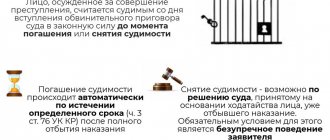Having a criminal record is a serious obstacle to a prosperous life. Because a person is haunted by restrictions even after he has served his sentence. Therefore, many convicts want to remove their criminal records from the database, however, this will only be possible in rare cases. Let's consider situations when you can remove an unwanted entry about a person's past.
What is a criminal record: deciphering the concept
This concept refers to the legal status of a person, which arises as a result of his conviction and sentencing with punishment for administrative or criminal crimes. As a result of a criminal record, a special relationship arises between a citizen and the state. A former convict is subject to certain burdens and his rights are limited, due to the potential danger to society. Among these restrictions:
- ban on leaving the country;
- inability to work as a teacher, educator, or organize recreation for minors;
- a ban on employment in government agencies, conducting legal, security, detective activities, a ban on working as a cadastral engineer, arbitration manager;
- inability to obtain permission to carry weapons or a hunting license;
- prohibition on establishing guardianship over minors, adoption;
- inability to serve in the police, work in the prosecutor's office or the judicial system.
If the former defendant committed another crime, then it will be considered evidence of the citizen’s increased danger to society. When qualifying a crime, a second conviction is taken into account as a relapse (Article 18 of the Criminal Code of the Russian Federation), and also acts as an aggravating circumstance (Article 63 of the Criminal Code of the Russian Federation).
According to the law, a citizen is considered to have a criminal record from the moment the court sentence comes into force until the criminal record is cleared or expunged. A person with an expunged criminal record is completely rehabilitated, freed from all restrictions and encumbrances. In fact, such a person is equated to citizens who have no problems with the law.
How does a criminal record get into the database?
Information about criminally or administratively punishable acts is recorded by the inquiry officer, prosecutor or investigator. The procedure for entering data into the Main Information and Analytical Center (GIAC RF) is regulated by a special document called the “Standard Regulations”. In accordance with it, a record enters the database in several stages:
- A criminal case is opened.
- Once the supervising prosecutor has made a decision on the case, the unit involved in the investigation has 24 hours to submit the information to a special registration and accounting department.
- From the registration and accounting department, the documentation is transferred to the Information Center, which is responsible for the category of the case that was assigned to it.
- From the Information Center, already generated crime statistics are transferred to the SIAC of the Russian Federation.
According to the Model Regulations, all crimes on the basis of which a criminal case was initiated, a case was refused, or a conviction was made are subject to recording and registration. The time when the illegal actions were committed does not matter.
The GIAC contains the following information:
- personal information about the criminal;
- information about a criminal record (number of proceedings, grounds for opening a case, sentence and date of its entry into force, information about the removal or expungement of a criminal record);
- information about being wanted;
- information about the arrest;
- fingerprint formula.
If the guilt of the detainee is proven, then information about him must be included in the database, even if the sentence was suspended. Removing information from the GIAC of the Russian Federation is possible only on rehabilitative grounds.
How to find out about a criminal record: who has access to the database
Even after a criminal record has been expunged, information about the criminal is stored in the databases of the Ministry of Internal Affairs. You can get a certificate about the presence or absence of problems with the law by writing a statement to the police.
Employers, banks and other interested parties can request the data. For example, when issuing a loan, a financial institution conducts thorough checks on the client. Not only his solvency is taken into account, but also his criminal history.
Only law enforcement agencies can freely use GIAC databases. No employee has the right to disclose information publicly. Data is provided only upon submission of the corresponding application.
Types of criminal record
A criminal record arises as a result of criminal punishment. The measure of influence on the violator is determined by Article 45 of the Criminal Code of the Russian Federation. This could be correctional labor, restriction of rights or arrest.
The law defines several types of criminal record:
Have a question for a lawyer? Ask now, call and get a free consultation from leading lawyers in your city. We will answer your questions quickly and try to help with your specific case.
Telephone in Moscow and the Moscow region: +7
Phone in St. Petersburg and Leningrad region: +7
Free hotline throughout Russia: 8 (800) 301-39-20
- The sentence was not carried into effect. For example, the court ruling was challenged by the accused. Then the criminal record is canceled from the moment the acquittal comes into force.
- When the decision was made on an urgent verdict. The criminal record in this case will consist of two parts. The term is counted both during punishment and after release.
- Criminal record, which includes primary and additional punishment. Her term will expire along with the end of the second part of the punishment.
When is a criminal record expunged by law?
In this case, the provisions of Article 86 of the Criminal Code of the Russian Federation are taken into account. It clearly states after how many years a criminal record is automatically expunged for crimes of varying severity:
- Conditional release - withdrawal occurs as soon as the probationary period expires.
- A mild sentence instead of imprisonment. The citizen is rehabilitated one year after the expiration of the sentence.
- If the crime is of moderate severity, then you need to wait 3 years after serving your sentence.
- In the case of serious crimes, rehabilitation occurs 8 years after serving the sentence.
- If the crime is classified by the court as especially serious, it will take 10 years from the moment the prison term is fully served for all restrictions to be lifted.
If the offender was released early or part of his sentence was replaced by probation, then expungement of the criminal record occurs when the time served expires or additional work is considered completed. At the same time, it is important that the former prisoner put an end to his criminal past and compensate for the damage resulting from his criminal activities.
When does a criminal record begin and end?
The criminal record begins automatically from the day the sentence comes into force. This status is retained by the offender while serving his sentence and for some time after it, as mentioned above.








